Kevin Sweeny: Ground game — do or die

In the election of 1840, Abraham Lincoln served as a Whig presidential elector in Illinois. In his push to elect the “Tippecanoe and Tyler, too” ticket, he sent a ten-point edict to all committee members containing a field plan of operations. Much has changed in the landscape of political campaigns since 1840, but the importance of a well-organized, strong field operation has never waned. It is a mainstay in the campaigning ecosystem and part of a successful formula to forge a path to victory and campaigns which ignore its impact, do so at their own candidate’s peril. A generation ago, many political scientists were signaling the death of the ground game. TV, mail and even the Internet would render such campaign expenditures obsolete. However, over the last few election cycles, the opposite has proved true. Moreover, deeply established ground games have had a tremendous impact in municipal and state elections, local referendums and state ballot initiatives, to federal elections. Recent cycles have confirmed staffing a field operations campaign with a well-trained and competent workforce to help a candidate interact voters still matters. From getting petitions signed, voters registered, identifying early voters, canvassing door to door, and staffing the polls on Election Day, field campaigns still matter. Their greatest impact is at the local and state levels. Despite this, field operation’s budgets pale in comparison to advertisements. However, in-person mobilization appears to be one of the more effective expenditures a campaign can make with limited resources, increasing voter turnout by as much as 10 percent according to a recent study. Contemporary political campaigns utilize a broad set of tools and methods for finding and contacting voters, more than at any point in electoral history. Much has been written about the roles of technology, big data and social media in recent campaigns. However, at the same time, there has been a corresponding rise in old-fashioned campaign techniques, particularly establishing a competent ground game. Field offices, typically but not always placed in strategic locations around a district or state help to transform basic campaign information into real voter contacts. Field offices often serve as the first and last point of contact between a political campaign and the electorate. A campaign’s headquarters gathers important and timely information on voters and in turn relays such information to the field manager. They, in turn, instruct their field workers to pinpoint a calculated message to a structured group of voters. Typically, the most effective of these field workers are well-trained volunteers who live locally. While campaigns rely on a certain percentage of outside paid field workers, by far these local volunteers are most successful in distributing campaign information. Campaign volunteers are typically true believers in a cause, person or organization. They usually act purely on the belief they are making their community a better place. While obviously paid workers are vital to a campaign, no one was ever paid to start a real revolution. A first-rate example of the impact of a competent ground game is best illustrated by recent presidential elections and field work impact. Because the Democratic Party keeps better field data than the Republican Party, I will use them as an example. In a recent experiment, the 2012 presidential election was replicated with all things being equal. However, in this replication, Obama had no real field offices for volunteers. The results showed Obama would have lost 248,000 votes nationwide. A further dive into these numbers points to Obama losing Florida and therefore the presidency. Continued runs by political scientists Seth Masket, Josh Darr and Matthew Levendusky show running the same field simulations in the 2008 election gave Obama his victory in North Carolina, Florida and Indiana. Recent claims of Obama being able to win the presidency without a ground game simply do not hold water. After a recent election, a British Election Study showed one-on-one field contact made all the difference in local campaigns, by as much as 14 percent. Furthermore, a simple face-to-face meeting at the door by a campaign or candidate yielded a 97 percent likelihood of the voter casting their ballot for those who made contact with them. Moreover, the study showed it is not just a one-time face-to-face contact which matters, the contact must be constant. Parties lost upward of 16 percent of those who were only approached at the door once and never followed up on. Suffice to say, field offices increase turnout and vote share for the candidates and organizations who take the time to adequately fund and staff them. Lastly, and one of my personal favorite incentives of producing a solid ground game on top of being able to ascertain if your campaign’s message is resonating among the electorate is it creates a legion of loyal volunteers who are prepared to carry on the legacy of the candidate or party. This legacy of political skill can prove to be invaluable not only to the volunteer but to the organization and the electorate as a whole. Well trained and passionate volunteers evolve into the next generation of campaign managers, consultants and operatives. They understand not only the complexities associated with running a political campaign, but they also make meaningful connections with the governing, consultant and economic classes. Moreover, they gain a broader understanding of the issues faced by the electorate and the campaign they represent. Some will even eventually step into the fray and become candidates themselves. Two examples of this evolving legacy quickly come to mind. The first is the losing “YES!” campaign for Scottish independence which morphed its field operation into a supportive role for the SNP (Scottish National Party). In return, the field campaigns for “YES!” handed the SNP the most seats in their party’s history and now the SNP is the outright ruling party in Holyrood. Another example much closer to home is Jeb Bush’s grassroots push on education issues dating as far back as his first unsuccessful run for Governor in 1994. The political initiatives are still pushed by a network of
Hillary Clinton aims to reset campaign with focus on black voters
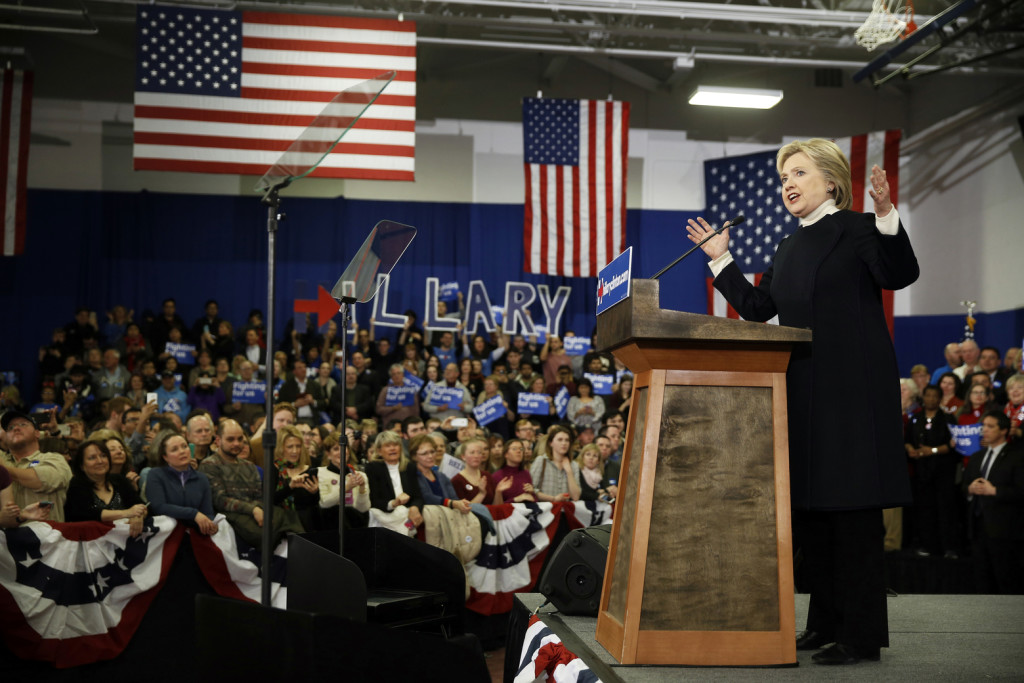
After an overwhelming loss in New Hampshire, Hillary Clinton is staking a campaign comeback on her ability to woo black and Latino voters, placing outreach to those communities at the center of her strategy to retool her 2016 bid. The 22-point loss to rival Bernie Sanders in this week’s primary heightened concerns among Democrats that Clinton’s message is failing to win over both women and young voters — two key parts of the coalition that twice elected Barack Obama to the White House. The New Hampshire defeat, along with Clinton’s razor-thin win in the leadoff Iowa caucuses, raised the stakes for Clinton to rally minority voters — another pillar of the Obama coalition — in the contests coming up in Nevada and South Carolina. As the contest fans out across the country, Clinton’s campaign is casting her as a stalwart advocate for racial justice, tracing back to her days working for the Children’s Defense Fund in the 1970s. She will tie her future even closer to Obama, a deeply beloved figure among black Americans. Clinton also plans to intensify her focus on issues of importance to minority voters, such as immigration, civil rights and gun control, dispatching African-American supporters to make her case and launching a flurry of attacks to undermine any credibility Sanders may be building within the black community. Focus-group surveys conducted by Clinton’s campaign with undecided black voters in Charleston found that the former secretary of state has retained a high degree of trust with African-Americans, even as her numbers on trust and honesty have declined overall, according to Clinton aides. While the voters were open to Sanders and liked his economic message, their views shifted after hearing about his plans to replace the Affordable Care Act with a single-payer health care system and his past opposition to gun control measures, the aides said. “One candidate voted to give immunity to the gun manufacturers and opposed the Brady bill. … I can’t get past that,” said Rep. Cedric Richmond, D-La., on Thursday as the Congressional Black Caucus’ political action committee endorsed Clinton. While Clinton still holds a big lead among party insiders known as superdelegates, who can support the candidate of their choice, the first two contests made clear that Sanders has undermined her once dominant position as the nomination favorite. Her aides believe the next two contests and the primaries that follow in March, where minority voters make up a larger slice of the electorate than in overwhelmingly white Iowa and New Hampshire, could essentially decide the race. She already has a head start with black voters. An NBC News/Wall Street Journal/Marist Poll in late January showed African-American voters said they preferred Clinton to Sanders, 74 percent to 17 percent Since New Hampshire, Clinton has launched a full-scale press, unveiling endorsements from top African-American leaders. At the CBC event on Thursday, Georgia Rep. John Lewis, a civil rights icon, said he would travel to South Carolina this weekend to campaign for her. Clinton’s team will also be rolling out the support of 119 black legislators in the March voting states. And she’ll be endorsed by faith leaders in Flint, Michigan, adding to the 28 ministers and 50 black mayors who’ve already expressed support. Meanwhile, Clinton supporters are targeting Sanders’ record on issues like racial equality and criminal justice, even playing down his early support for the civil rights movement as a college student who joined the 1963 March on Washington. “Thousands of people walked on Washington. What are the real policy issues or legislation that he has presented?” said Dr. Hazel Dukes, president of the NAACP’s New York State Conference. On Friday, Clinton will head to rural Bamberg County, South Carolina, a poor, majority-black area, to hold a town hall on racial and economic disparities. She’s holding a Monday campaign event in Riviera Beach, Florida, a majority African-American city, before meeting with civil rights leaders on Tuesday and holding a campaign event with the mother of Sandra Bland, the Chicago-area woman whose death in a Texas jail cell has become a rallying cry for criminal justice reform. Former President Bill Clinton is being dispatched to Memphis, Atlanta and Florence, South Carolina, and the Clintons’ daughter, Chelsea, is heading to Flint, where the crisis over water has become a symbol of racial and economic inequality. Sanders’ campaign plans to promote his personal story, arguing that his early work as a college civil rights activist and his message of economic equality will help diversify his support. On Wednesday, he held a heavily publicized breakfast with civil rights activist Al Sharpton in Harlem, and Ta-Nehisi Coates, an influential writer on racial issues, said he would vote for Sanders. But his team also acknowledges that his constituency may be far stronger in states with less diverse Democratic electorates, like Oklahoma, Minnesota, and Massachusetts — all states where they launched new ads on Wednesday. “Bernie Sanders has an incredibly powerful story to tell,” said adviser Tad Devine. “His fight for equality and civil rights, his fight against inequality and economic injustice is very, very powerful. It’s going to resonate with the African-American community.” Republished with permission of the Associated Press.
Officials: More work emails from Hillary Clinton’s private account
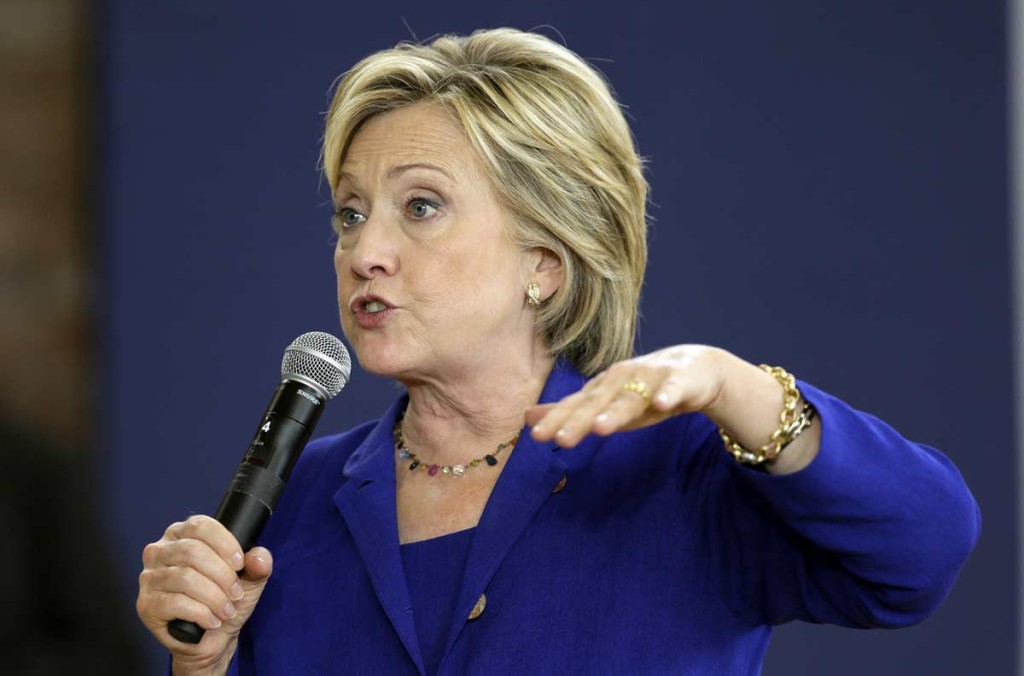
The Obama administration has discovered a chain of emails that Hillary Rodham Clinton failed to turn over when she provided what she said was the full record of work-related correspondence as secretary of state, officials said Friday, adding to the growing questions related to the Democratic presidential front-runner’s unusual usage of a private email account and server while in government. The messages were exchanged with retired Gen. David Petraeus when he headed the military’s U.S. Central Command, responsible for running the wars in Iraq and Afghanistan. They began before Clinton entered office and continued into her first days at the State Department. They largely pertained to personnel matters and don’t appear to deal with highly classified material, officials said, but their existence challenges Clinton’s claim that she has handed over the entirety of her work emails from the account. Republicans have raised questions about thousands of emails that she has deleted on grounds that they were private in nature, as well as other messages that have surfaced independently of Clinton and the State Department. Speaking of her emails on CBS’ “Face the Nation” this week, Clinton said: “We provided all of them.” But the FBI and several congressional committees are investigating. The State Department’s record of Clinton emails begins on March 18, 2009 — almost two months after she entered office. Before then, Clinton has said she used an old AT&T Blackberry email account, the contents of which she no longer can access. The Petraeus emails, first discovered by the Defense Department and then passed to the State Department’s inspector general, challenge that claim. They start on Jan. 10, 2009, with Clinton using the older email account. But by Jan. 28 — a week after her swearing in — she switched to using the private email address on a homebrew server that she would rely on for the rest of her tenure. There are less than 10 emails back and forth in total, officials said, and the chain ends on Feb. 1. The officials weren’t authorized to speak on the matter and demanded anonymity. But State Department spokesman John Kirby confirmed that the agency received the emails in the “last several days” and that they “were not previously in the possession of the department.” Kirby said they would be subject to a Freedom of Information Act review like the rest of Clinton’s emails. She gave the department some 30,000 emails last year that she sent or received while in office, and officials plan to finish releasing all of them by the end of January, after sensitive or classified information is censored. A quarter has been made public so far. Additionally, Kirby said the agency will incorporate the newly discovered emails into a review of record retention practices that Clinton’s successor, Secretary of State John Kerry, initiated in March. “We have also informed Congress of this matter,” he added. These steps are unlikely to satisfy Clinton’s Republican critics. The House Benghazi Committee plans to hold a public hearing with Clinton next month to hear specifically about what the emails might say about the attack on a U.S. diplomatic outpost in Libya that killed four Americans on Sept. 11, 2012. And the Senate Judiciary Committee’s GOP chairman said he wants the Justice Department to tell him if a criminal investigation is underway into Clinton’s use of private email amid reports this week that the FBI recovered deleted emails from her server. The Senate Homeland Security Committee also is looking into the matter. Clinton has repeatedly denied wrongdoing. “When I did it, it was allowed, it was above board. And now I’m being as transparent as possible, more than anybody else ever has been,” she said earlier this week. In August, Clinton submitted a sworn statement to a U.S. District Court saying she had directed all her work emails to be provided to the State Department. “On information and belief, this has been done,” she said in a declaration submitted as part of a lawsuit with Judicial Watch, a conservative advocacy group. The Clinton campaign didn’t respond immediately to a request from The Associated Press for comment, but on Twitter, Brian Fallon, the Clinton campaign’s press secretary, wrote Friday: “We always said the emails given to State dated back only to March 09. That was when she started using http://clintonemail.com .” Clinton has been dogged for months by questions about her email practices. She initially described her choice as a matter of convenience, but later took responsibility for making a wrong decision. Separately Friday, State Department officials said they were providing the Benghazi-focused probe more email exchanges from senior officials pertaining to Libya. The committee broadened its scope after examining tens of thousands of documents more specifically focused on the Benghazi attack. Republished with permission of the Associated Press.
Donald Trump: Deport children of immigrants living illegally in U.S.
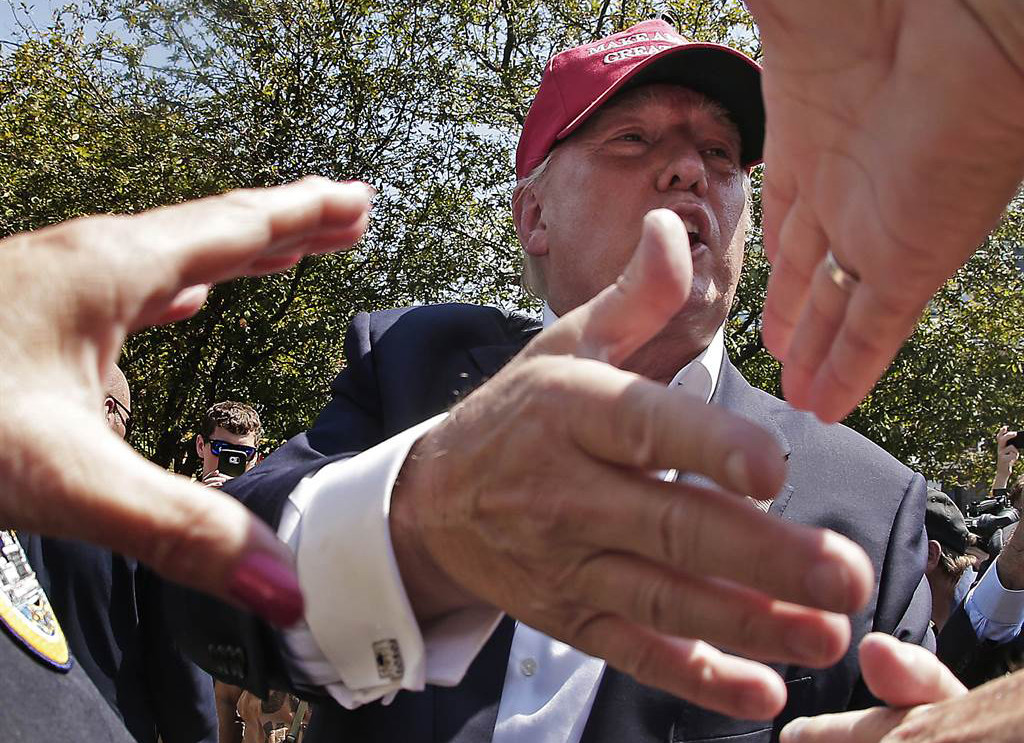
Republican presidential candidate Donald Trump wants more than a wall to keep out immigrants living in the country illegally. He also wants to end “birthright citizenship” for their children, he said Sunday. And he would rescind Obama administration executive orders on immigration and toughen deportation, allowing in only “the good ones.” Trump described his expanded vision of how to secure American borders during a wide-ranging interview Sunday on NBC’s “Meet The Press,” saying that he would push to end the constitutionally protected citizenship rights of children of any family living illegally inside the U.S. “They have to go,” Trump said, adding: “What they’re doing, they’re having a baby. And then all of a sudden, nobody knows…the baby’s here.” Native-born children of immigrants — even those living illegally in the U.S. — have been automatically considered American citizens since the adoption of the 14th amendment of the U.S. Constitution in 1868. The odds of repealing the amendment’s citizenship clause would be steep, requiring the votes of two-thirds of both houses of Congress and support from three-fourths of the nation’s state legislatures. Republicans in Congress have pushed without success to repeal that provision since 2011. “They’re illegal,” Trump said, describing native-born children of people living illegally in the US. “You either have a country or not.” Trump’s remarks came as his campaign website posted his program for “immigration reform.” Among its details: Making Mexico pay for a permanent border wall. Mandatory deportation of all “criminal aliens.” Tripling the force of immigration officers by eliminating tax credit payments to immigrant families residing illegally in the U.S. He said that families with U.S.-born children could return quickly if deemed worthy by the government. “We’re going to try and bring them back rapidly, the good ones,” he said, adding: “We will expedite it so people can come back in. The good people can come back.” Trump did not elaborate on how he would define “good people.” But echoing earlier controversial remarks that Mexico was sending criminals across the border, Trump said a tough deportation policy was needed because “there’s definitely evidence” of crimes linked to immigrants living in the country illegally. The New York businessman also said he would waste little time rescinding President Barack Obama’s executive actions aimed at allowing as many as 3.7 million immigrants living illegally in the U.S. to remain in the country because of their U.S.-born relatives. Obama’s November 2014 actions were halted by temporary injunctions ordered by several federal courts in rulings challenging his executive powers to alter immigration policies without Congressional approval. The cases could lead to the U.S. Supreme Court. “We have to make a whole new set of standards,” Trump said. “And when people come in, they have to come in legally.” On Sunday, Ohio Gov. John Kasich echoed Trump’s call to finish construction of an incomplete system of barriers on the nation’s southern border with Mexico. There are still gaps in the barriers, which have been under construction since 2005. Speaking on CBS’ “Face the Nation,” Kasich said he would “finish the wall” but would then work to legalize 12 million immigrants now estimated to live in the U.S. illegally. Kasich said he would “make sure we don’t have anybody — any of the criminal element here.” He would also revive the guest-worker programs that previously brought in temporary workers to aid in farming and other industries hobbled by labor shortages. Most other GOP candidates also back completing the border wall but differ over how to treat immigrant families already living in the U.S. Former Florida Gov. Jeb Bush recently released his own immigration plan calling for the use of forward bases and drones to guard the border, but also backing an eventual plan to legalize the status of immigrant families. Bush disagrees with Obama’s use of executive actions to unilaterally enforce the policy. Florida Sen. Marco Rubio worked with senators from both parties to develop a comprehensive plan in 2013 that would have legalized the status of many immigrant families. But Congress balked at the idea as tea party Republicans opposed the deal and Rubio has since backed away from his support. Republished with permission of the Associated Press.
As Democrats fret over ‘sharing economy,’ GOP moves in
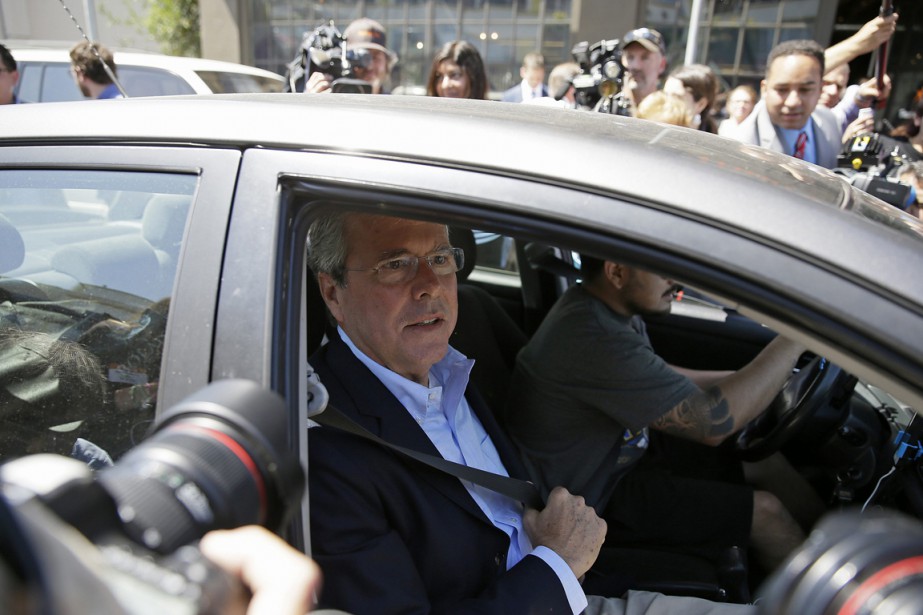
The debate over ride-hailing firm Uber is laying bare divides in the Democratic Party and on the left about how to handle the new “sharing” economy. Republicans are hungry to exploit that ambivalence and make inroads into a wealthy sector of the tech industry. In New York City this past week, liberal Mayor Bill de Blasio tried to limit the number of Uber drivers on the streets, only to be rebuked by the state’s more centrist governor, Andrew Cuomo. The mayor’s administration decided to allow Uber to expand in the city for another year. That followed a pledge by the party’s presidential front-runner, Hillary Rodham Clinton, to “crack down” on companies that classify workers as contractors rather than employees, as critics contend Uber and other companies often do. Clinton did not identify Uber, whose lobbying operation is run by former Obama campaign manager David Plouffe and stocked with Democratic operatives. But her allusion led Jeb Bush, a Republican technophile who says he prefers his Apple watch to apple pie, to ride in an Uber vehicle during a campaign stop in San Francisco days later. For years, Republicans have struggled to gain support in the technology industry, an effort hobbled by in part by their stance on social issues and net neutrality, which is the idea that Internet service providers should not manipulate, slow or block data moving across their networks. But the bright-blue precincts of Silicon Valley have become a regular stop on the GOP circuit. Kentucky Sen. Rand Paul opened a campaign office at a San Francisco tech incubator that hosted a 24-hour “hack-a-thon” last month. Florida Sen. Marco Rubio won the backing of Oracle founder Larry Ellison. He held a fundraiser for the senator, whose new book has a chapter with this title: “Making America Safe for Uber.” “There’s a lot of folks out here who naturally fall into a libertarian place and in the past they were not feeling the love from the GOP,” said Scott Banister, an investor who is raising money for Paul. “Obviously, if the Democratic Party is going to come down on the side of ‘let’s shut down these businesses,’ that’s going to force the issue.” Liberals have increasingly questioned the impact of the industry during a time of scarce jobs and wage stagnation. Former Treasury Secretary Larry Summers has noted that Apple employs a far smaller share of people than companies of its size did in the past. Silicon Valley and the surrounding Bay Area have become a symbol of the income inequality that Democrats bemoan. But it is the recent, explosive growth of Uber and other “sharing economy” companies that have attracted the most concern. HomeJoy recently announced it would shut down in the face of four lawsuits alleging it should treat the people who clean homes on its behalf as employees rather than as independent contractors not entitled to the same workplace protections. “If a technologist wants to disrupt an industry that has middle-class jobs and replace them with insecure, not-as-good jobs, there has to be a conversation about that,” said Heath McGee, president of the liberal think-tank Demos. “Just because there’s an app doesn’t mean it’s anything different. … It’s a question as old as the economy.” Lyft, Uber or the grocery delivery service Instacart and others rely on independent contractors to provide services for a fee: driving, house cleaning, grocery shopping and the like. Uber takes a commission from fees charged to its riders. The drivers, who can work as many or as few hours as they would like, get the rest. Many Uber drivers work part time to supplement their income, while others rely on it entirely. Founded in 2009, it was operating in more than 250 cities and 21 countries by the end of last year. Such innovations have hit core Democratic constituencies. Among them are taxi companies that give generously to urban politicians such as de Blasio, and professors worried about the proliferation of online higher educational courses. But they also benefit another core group: the young, urban people who supported President Barack Obama. Former Obama adviser Dan Pfeiffer warned in a recent that “progressive politicians are making a major error by positioning against the sharing economy.” Banister, the investor helping Paul, said Democrats seem torn on the sharing economy, “not quite sure where the electorate wants them to be.” Republicans, he added, are “able to come back and say, ‘We’re not wishy-washy about this,’” because business, jobs and the economy form “the core of the GOP.” Larry Gerston, political science professor emeritus at San Jose State, said the Uber skirmishes will have limited impact in Silicon Valley, which is far more concerned with federal policy on matters such as patent protection. But Julie Samuels, executive director of Engine, a nonprofit that tries to connect startups with policy debates, said the tone of the debate is worrisome. “When any policymaker starts to ostracize the tech community, they’re ostracizing people who can make things better,” she said. Republished with permission of the Associated Press.
Responding to King v. Burwell decision, Jeb Bush calls for “repeal and replace” of ACA
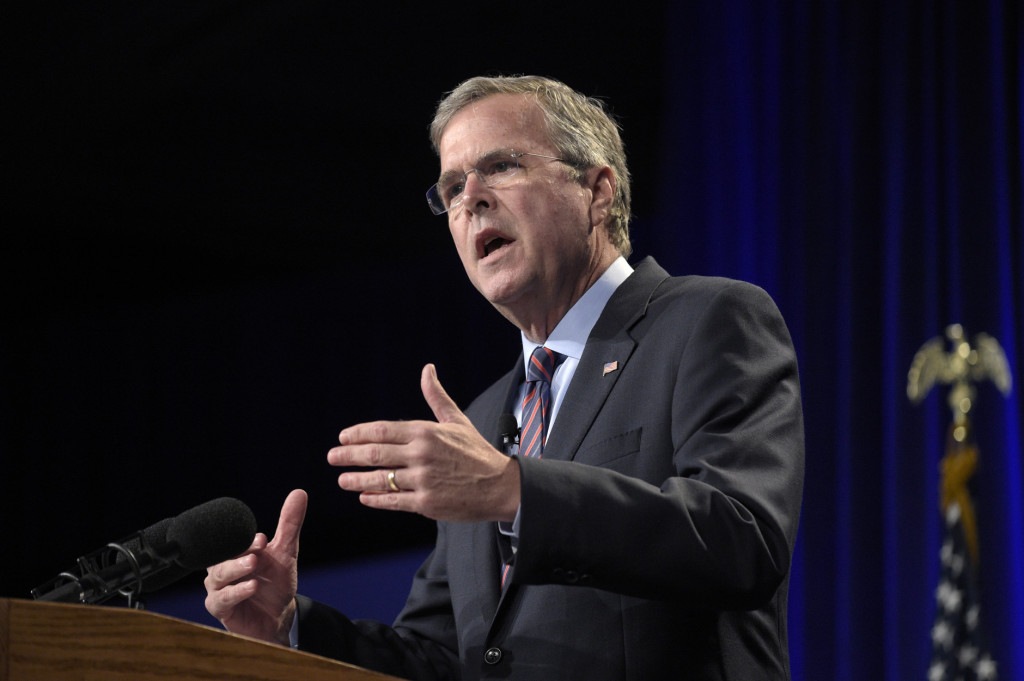
Jeb Bush expressed dissatisfaction with the U.S. Supreme Court decision that tax subsidies are still available to all those enrolled in an Obamacare plan, through either a state or the federal health insurance exchange. In a 6-3 ruling Thursday, the court affirmed the U.S. 4th Circuit Court of Appeals decision in King v. Burwell. The decision is seen as a major victory for Barack Obama’s administration. Bush, campaigning for the Republican presidential nomination in 2016, repeated his vow to repeal the Affordable Care Act if elected. He contends patients should be in charge of their own decisions, and health care reform should “actually lower costs.” “I am disappointed by today’s Supreme Court ruling in the King v. Burwell case,” the former Florida governor said in a statement. “But this decision is not the end of the fight against Obamacare.” The Obamacare challenge would have jeopardized nearly 1.28 million Floridians who signed up for health care through the federal exchange and received tax credits. Thirty-four states, including Florida, declined to create the exchanges. According to the U.S. Census Bureau, nearly 6-in-10 Americans (59.4 percent) live in states that chose not to set up their own insurance exchanges under the ACA. “This fatally flawed law imposes job-killing mandates, causes spending in Washington to skyrocket by $1.7 trillion, raises taxes by $1 trillion and drives up health care costs,” Bush said. “Instead of fixing our health care system, it made the problems worse. “As president of the United States, I would make fixing our broken health care system one of my top priorities. I will work with Congress to repeal and replace this flawed law with conservative reforms that empower consumers with more choices and control over their health care decisions. “Entrepreneurs should be freed to lower costs and improve access to care – just like American ingenuity does in other sectors of the economy. … Americans deserve leadership that can actually fix our broken health care system, and they are certainly not getting it now from Washington, D.C.”
Luther Strange, Katherine G. Robertson call federal energy plan “overreach”

In the torrent of overreaching directives coming from Washington to the states, Alabamians may not be aware of the ongoing effort by the Environmental Protection Agency to sidestep Congress and stage a takeover of American energy. Not only are their regulations likely unconstitutional, but they would have a particularly negative effect on Alabama’s economy and our most vulnerable residents. Late last year, the Obama Administration announced a sweeping new regulatory scheme, the Clean Power Plan, aimed at reducing carbon emissions. The plan would force electricity suppliers to: Spend money on so-called efficiency projects that produce less energy at higher costs; Invest in unproven renewable energy projects that produce less energy than less-expensive, conventional methods; Artificially limit the amount of electricity customers can use; Operate gas-fired power plants even if other, less expensive energy sources are available, and; Unjustifiably deny consumers access to existing, lower-cost coal-fired plants that were paid for through current low rates. If a state does not comply, a “federal plan” will be imposed. As Attorney General Luther Strange recently testified before the U.S. Senate, the plan ignores well-established limits of its executive authority under the Clean Air Act and aims to fundamentally alter the way America produces and uses energy. The latest executive overreach, it will lead to enormous uncertainty about the way many states, including Alabama, produce and use energy and will give rise to harmful economic effects. Not only will the cost of energy go up, unduly harming those on fixed incomes, but it will directly increase the cost of many goods and services. There are even concerns of threats to energy grids during peak months. Nevertheless, the Obama Administration has largely ignored those likely consequences and has gone to great lengths to disguise the negative economic, social, and reliability effects that its new regulations will have. For Alabama, the EPA ruling requires the state’s power plants to cut carbon emissions by 27 percent by 2030. To put that in perspective, consider this: More than half of all the electricity Alabama Power generates in the state comes from coal-fired plants and more than 16,000 Alabama jobs are dependent upon the coal industry, which has an estimated $1.3 billion economic benefit to the state. The story gets worse for the individual family. A November 2014 study by Energy Venture Analysis indicates the EPA’s proposed rule would increase the average annual Alabama household energy bills by more than $800 (or 36 percent) in 2020. In Alabama, EPA’s plan would increase the total annual cost of energy to almost $15 billion in 2020. That’s a $5.2 billion annual cost increase for energy in Alabama. Such costs will deal an especially heavy blow to households earning less than $10,000 per year. Nationally, those families already spend an astounding 60-80 percent of their income on energy. Even households earning between $10,000 and $30,000 per year still spend more than 20 percent of their income on energy. In short, the EPA is attempting to make fundamental and irreversible changes to American energy production that will jeopardize Alabama families’ economic well-being by making states do what the EPA cannot. Although environmental stewardship is vital, ceding more power to the federal government rarely produces the desired results. Economic growth, environmental stability, and energy reform are best achieved through open markets and innovation. Attorney General Strange joined 11 other state attorneys general in August to sue the EPA to block implementation of its costly and controversial carbon emission rule that will force Alabamians to live in the dark in order to satisfy the Obama Administration’s political agenda. As was noted in The Wall Street Journal this week, “the more states that refuse to give in to the EPA’s demands, the more likely it is that the agency will be forced to hold back the most burdensome elements of its Clean Power Plan.” The Alabama Attorney General’s Office and the Alabama Policy Institute are united in the fight against this most recent, brazen attempt by the federal government to coerce state action while dismissing the very real threats that these regulations pose to our economy and citizens. Luther Strange is Alabama’s attorney general. Katherine Robertson is vice president of the Alabama Policy Institute, an conservative nonprofit research and education organization dedicated to the preservation of free markets, limited government and strong families. If you would like to speak with the authors, please email communications@alabamapolicy.org or call (205) 870-9900.


